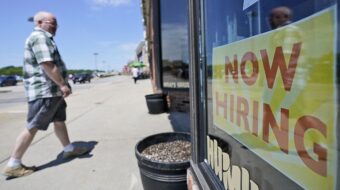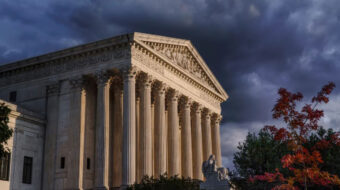Twenty years ago, I stood before the Democratic Convention in San Francisco, a candidate for the presidency of the United States, to speak of the hopes and dreams of Americans who, lacking voice in their everyday lives as well as the political process, took an apathetic attitude toward voting. That night I challenged the party to expand its center, to make room for America’s working poor, our struggling middle class, those at the bottom who were and are the heart of the multi-ethnic, multi-issue Rainbow Coalition — the organization that spurred my 1984 presidential campaign.
In 1984, we registered 2 million new voters. In 1986, we helped return the U.S. Senate to the Democrats. In 1988, we helped elect newly empowered candidates, including New York City Mayor David Dinkins, Virginia Gov. Douglas Wilder and others in cities, counties and states across the nation.
The strategy of expanding the center, enfranchising all of America, worked for Arkansas Gov. Bill Clinton. Remember, the elder Bush and Sen. Bob Dole got more white votes alone than Clinton. But Clinton got more white, Black, brown and Asian votes than they did — and he won.
Yet if the ’84 and ’88 elections empowered the disenfranchised, the 2000 election showed their vulnerability. In that calamity for democracy, Florida alone dumped 179,000 votes — 54 percent of them cast by African Americans. Nationwide, nearly 2 million votes went uncounted. Half of them were Black, according to data from the U.S. Civil Rights Commission and Harvard University’s Civil Rights Project.
Is it any wonder that, four decades after the Selma march and four years after that flagrantly stolen 2000 election, some 8 million to 10 million African Americans are not registered to vote? According to the Joint Center for Political and Economic Studies, 936,000 remain unregistered in New York; 600,000 in Georgia; 550,000 in Texas; 530,000 in North Carolina; 380,000 in Illinois; 500,000 in New Jersey; 475,000 in Virginia; 600,000 in Florida, 400,000 in Mississippi; 300,000 in South Carolina; and 300,000 in Louisiana.
As the Democrats … mobilize support for John Kerry and John Edwards, we must also mobilize the disenfranchised. We must register them; we must see that they vote; we must make sure every vote cast is counted.
Simple math demonstrates: Even granting the 20 states Al Gore won in 2000 leaves the Democrats 10 electoral votes short. The South is problematic: John Edwards came to the Senate in 1988 with 42 percent of the white vote — and 92 percent of the Black vote. No progressive candidate of the South wins on white votes; 85 to 90 percent of the Black vote is essential. This year’s wild card, Ralph Nader, makes every vote crucial. …
I met with civil-rights and political leaders to strategize around mobilizing and protecting the vote. This fall we will return to Florida, the scene of the crime, and to precincts across the nation, exercising our collective strength, protecting our franchise.
I said in San Francisco 20 years ago: “This is not a perfect party. We are not a perfect people. Yet, we are called to a perfect mission. Our mission: to feed the hungry; to clothe the naked; to house the homeless; to teach the illiterate; to provide jobs for the jobless; and to choose the human race over the nuclear race.”
Today we issue a call of conscience, of expansion, healing, unity and redemption. We can win. Leadership can part the waters, lift the boats stuck at the bottom, and redirect our nation toward the Promised Land. Together, with a message of healing and hope, we can re-open the “one big tent” that is America at its best.
The Rev. Jesse L. Jackson Sr. is founder and president of the Rainbow/PUSH Coalition. This article originally appeared in the San Francisco Chronicle, July 23.











Comments